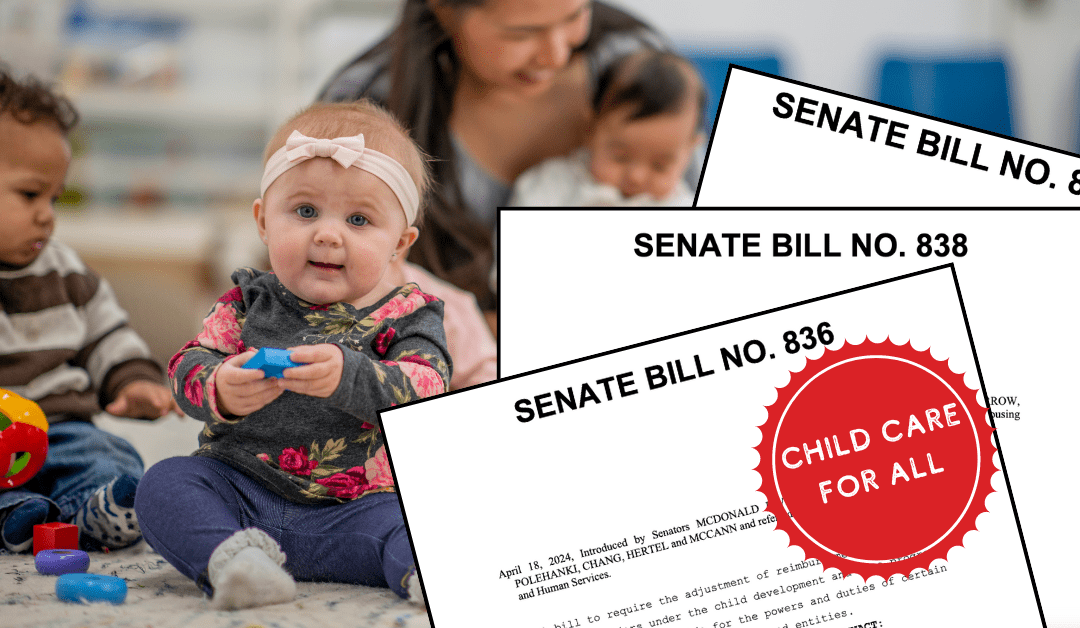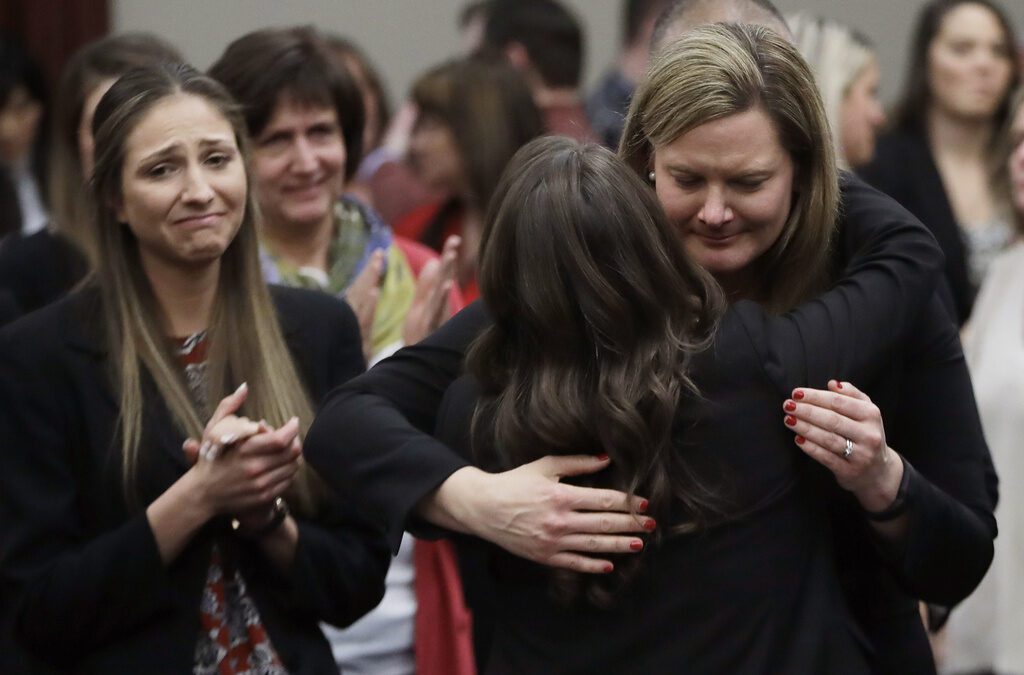
State Sen. Stephanie Chang (D-Detroit) with one of her young children. (Stephanie Chang for Senate via Facebook)
Legislation introduced in the House and Senate would enable state and local political candidates to spend campaign donations on childcare and caregiving—and it could help thousands of ordinary people run for office.
LANSING—It’s been a big year for women—and mothers—in Michigan politics. And under legislation introduced this month, state lawmakers plan to keep it that way.
More than 2.4 million Michigan women cast their ballots in November, representing about 54% of voters statewide, state data shows. Those votes were clearly reflected in Lansing this year.
There are now 60 women serving in the Democratic-led state Legislature—seven more than last year, and more than twice as many as 2016. Women, for the first time in state history, make up the majority of the Democratic caucuses. State Sen. Winnie Brinks leads the Senate. Rep. Laurie Pohutsky is the House Speaker Pro Tempore. Three women also have control of the governor’s desk, the secretary of state’s office, and the office of the attorney general.
But despite the progress, men have always dominated state and local politics—and they still do.
There are roughly 70,000 more women than men living in Michigan, yet there are 28 more men than women in the state House and Senate. The disparities are far worse in local city and township governments. Sen. Stephanie Chang (D-Detroit) wants to help level the field.
“We want to make sure that people can use campaign funds to pay for childcare. It really just makes so much sense,” Chang told The ‘Gander. “We want more parents in office, and we know that childcare can be very expensive—and that can be a challenge for folks who want to run.”
READ MORE: After Years of Misogyny in Lansing, Progressive Women Are in Charge
Senate Bill 278, which was introduced by Chang this month, would carve out new allowances in campaign finance laws that would enable all statewide and locally elected candidates to spend their political donations on childcare expenses incurred from time spent on the campaign trail.
Currently, political donations can only be used to cover childcare expenses for Michiganders running for federal office, Chang said. And with women taking on as much as three times as much child care as men, the restriction has had a disproportionate impact on Michigan moms.
“We need more moms [in office]. We need more parents,” Chang said. “They help make sure that we have diverse points of view, especially as we talk about issues facing families with kids. It helps to have people with kids who are living that experience to help shape these policies.”
State Rep. Rachel Hood (D-Grand Rapids) introduced an identical bill in the state House this month. Both were also introduced last year, but they ultimately stalled out under Republican leadership. This year’s bills also include new allowances to cover the caregiving costs of adults with disabilities—and have since been referred to legislative committees for further review.

“Knowing how vigorous my first campaign was, and as someone who had never ran for office before that, you have to work really hard,” Chang said. “I think (childcare costs) can be a barrier for people, and they’ll choose not to run for office. If we can get this passed, I think it might actually encourage more people to realize that they can actually do this and run office for office.”
She added: “I think that by not having this, we have probably cut some people out of the process. Not intentionally—but because it’s hard. It’s hard to be a mommy legislator.”
Data shows the average annual cost of infant care in Michigan is $10,861—or about $905 per month. With just one child, that’s enough to drain about 19% of the median family’s income—and it’s only about $1,600 less than in-state tuition for a four-year public university.
If the bills end up getting a signature from Gov. Gretchen Whitmer, Michigan would become the 27th state to approve the use of campaign funds to cover childcare costs—either through legislation (like these two bills) or through specific ethics guidelines or attorney general rulings. Candidates in three other states are spending donations on child care without explicit approval.
Liuba Grechen Shirley is a former Democratic congressional candidate from New York who was responsible for a 2018 Federal Election Commission ruling that allowed those running for federal office to spend campaign donations on childcare costs. After the election, she founded the Vote Mama Foundation specifically to advocate for similar changes in all 50 states.
She told The ‘Gander that she is “very involved” in the efforts to bring the legislation to Michigan, and has “worked very closely” with both Chang and Hood to get it passed into law this year.

“We have some terrible policies in this country. Our policies have failed women, failed children, and failed working families, and it’s because we have so few moms at the decision-making table. …” Shirley said. State legislatures, in particular, were designed for wealthy, older white men to run for office. It’s very difficult to convince a working person to run for a state office.”
Research from last year showed that Nevada was the only state legislature to achieve equal representation of women. And though most states had at least half the number of women needed to proportionately represent their constituents, mothers were hardly represented at all.
In Michigan, only about 6% of the state Legislature was composed of mothers with children.
Shirley added: “If you have more people with lived experiences at the table, then the policies being passed would change drastically. Not being able to use your campaign funds on child care is one major structural barrier. It seems like a small change, but it has the ability to completely transform the political landscape. It changes who gets to step up and run in the first place.”
READ MORE: Michigan Program Aims to Get More Women in Local Government
For the latest Michigan news, follow The ‘Gander on Twitter.
Follow Political Correspondent Kyle Kaminski here.
Politics

Investigator says Trump, allies were uncharged co-conspirators in plot to overturn Michigan election
DETROIT—A state investigator testified Wednesday that he considers former President Donald Trump and his White House chief of staff to be uncharged...

Michigan Dems introduce ‘Child Care for All’ legislation to lower costs for families
Lawmakers say Michigan is facing a ‘child care crisis.’ But a series of bills introduced this month would help to make child care (much) more...

Families of mass shooting victims and survivors call for education on new safe storage laws
BY KYLE DAVIDSON, MICHIGAN ADVANCE MICHIGAN—Parents of victims and survivors of the Oxford High School and Michigan State University shootings on...
Local News

US government agrees to $138.7M settlement over FBI’s botching of Larry Nassar assault allegations
DETROIT—The US Justice Department announced a $138.7 million settlement Tuesday with more than 100 people who accused the FBI of grossly mishandling...

NFL draft has been on tour for a decade and the next stop is Detroit, giving it a shot in spotlight
DETROIT—The NFL draft has taken the show on the road for a decade, giving cities around the country a chance to be in the spotlight. Detroit is on...






